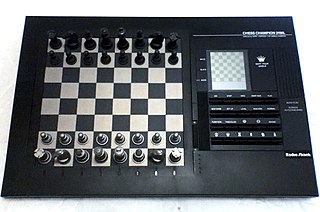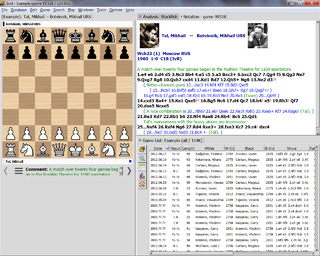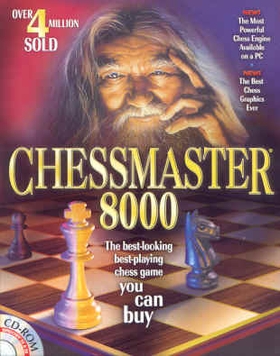
Computer chess includes both hardware and software capable of playing chess. Computer chess provides opportunities for players to practice even in the absence of human opponents, and also provides opportunities for analysis, entertainment and training. Computer chess applications that play at the level of a chess grandmaster or higher are available on hardware from supercomputers to smart phones. Standalone chess-playing machines are also available. Stockfish, Leela Chess Zero, GNU Chess, Fruit, and other free open source applications are available for various platforms.
The Universal Chess Interface (UCI) is an open communication protocol that enables chess engines to communicate with user interfaces.
ChessBase is a German company that develops and sells chess software, maintains a chess news site, and operates an internet chess server for online chess. Founded in 1986, it maintains and sells large-scale databases containing the moves of recorded chess games. The databases contain data from prior games and provide engine analyses of games, while endgame tablebases offer optimal play in some endgames.

In computer chess, a chess engine is a computer program that analyzes chess or chess variant positions, and generates a move or list of moves that it regards as strongest.

Shredder is a commercial chess engine and graphical user interface (GUI) developed in Germany by Stefan Meyer-Kahlen in 1993. Shredder won the World Microcomputer Chess Championship in 1996 and 2000, the World Computer Chess Championship in 1999 and 2003, the World Computer Speed Chess Championship in 2002, 2003, 2004, 2005, and 2007, and the World Chess Software Championship in 2010.

HIARCS is a proprietary UCI chess engine developed by Mark Uniacke. Its name is an acronym standing for higher intelligence auto-response chess system. Because Hiarcs is written portable in C, it is available on multiple platforms such as Pocket PC, Palm OS, PDAs, iOS, Microsoft Windows and Mac OS X.

Fritz is a German chess program originally developed for Chessbase by Frans Morsch based on his Quest program, ported to DOS, and then Windows by Mathias Feist. With version 13, Morsch retired, and his engine was first replaced by Gyula Horvath's Pandix, and then with Fritz 15, Vasik Rajlich's Rybka.
Chessmaster is a chess-playing video game series, which is owned and developed by Ubisoft. It is the best-selling chess franchise, with more than five million units sold as of 2002. The same cover art image featuring Will Hare was used from Chessmaster 2000 to Chessmaster 9000.

Shane's Chess Information Database (Scid) is a free and open source UNIX, Windows, Linux, and Mac application for viewing and maintaining large databases of chess games. It has features comparable to popular commercial chess software. Scid is written in Tcl/Tk and C++.
This article documents the progress of significant human–computer chess matches.

Chessmaster 8000 is a 2000 chess video game developed and published by Mattel Interactive for the Windows. It is part of the Chessmaster series.

Chessmaster 7000 is a 1999 chess video game developed and published by Mindscape for the Windows. It is part of the Chessmaster series.

Stockfish is a free and open-source chess engine, available for various desktop and mobile platforms. It can be used in chess software through the Universal Chess Interface.

Komodo and Dragon by Komodo Chess are UCI chess engines developed by Komodo Chess, which is a part of Chess.com. The engines were originally authored by Don Dailey and GM Larry Kaufman. Dragon is a commercial chess engine, but Komodo is free for non-commercial use. Dragon is consistently ranked near the top of most major chess engine rating lists, along with Stockfish and Leela Chess Zero.

Kasparov's Gambit, or simply Gambit, is a chess playing computer program created by Heuristic Software and published by Electronic Arts in 1993 based on Socrates II, the only winner of the North American Computer Chess Championship running on a common microcomputer. It was designed for MS-DOS while Garry Kasparov reigned as world champion, whose involvement and support was its key allure. A Macintosh version was planned to be released in 1995.

Don Dailey was an American researcher in computer chess and a game programmer. Along with collaborator Larry Kaufman, he was the author of the chess engine Komodo. Dailey started chess programming in the 1980s, and was the author and co-author of multiple commercial as well as academic chess programs. He has been an active poster in computer chess forums and computer Go newsgroups. He was raised as a Jehovah's Witness and served in recent years as an elder in the church of Roanoke.

Chess.com is an internet chess server and social networking website. The site has a freemium model in which some features are available for free, and others are available for accounts with subscriptions. Live online chess can be played against other users in daily, rapid, blitz or bullet time controls, with a number of chess variants available. Chess versus a chess engine, computer analysis, chess puzzles and teaching resources are offered.

AlphaZero is a computer program developed by artificial intelligence research company DeepMind to master the games of chess, shogi and go. This algorithm uses an approach similar to AlphaGo Zero.

Leela Chess Zero is a free, open-source, and deep neural network–based chess engine and volunteer computing project. Development has been spearheaded by programmer Gary Linscott, who is also a developer for the Stockfish chess engine. Leela Chess Zero was adapted from the Leela Zero Go engine, which in turn was based on Google's AlphaGo Zero project. One of the purposes of Leela Chess Zero was to verify the methods in the AlphaZero paper as applied to the game of chess.
The history of chess began nearly 150 years ago, and over the past century and a half the game has changed drastically. No technology or strategy, however, has changed chess as much as the introduction of chess engines. Despite only coming into existence within the previous 70 years, the introduction of chess engines has molded and defined how top chess is played today.









